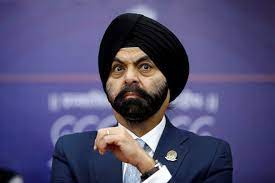Matt Kennard & Claire Provost
The World Bank’s new President Ajay Banga is on a mission to write “a new playbook” for the almost 80-year-old institution that he took over in June. As described in a welcome email he sent to staff, his vision is for it “to create a world free from poverty on a livable planet.”
Behind him are growing calls for reform of the World Bank to make it more effective in responding to climate change and off-track development goals. They’ve included demands for more resources to tackle these global challenges, and easier and faster ways to disburse money, as well as calls for increased transparency and accountability including to local communities. But meaningful reform will remain elusive until this is understood: the bank has actually been very successful – just not for the poor it’s claimed to serve. Ending global poverty is not a new official mission for the World Bank. Ten years ago, it adopted “ending extreme poverty and promoting shared prosperity” as its overarching objectives. Poverty was first articulated as a target 50 years ago, in 1973 when the bank’s then-President Robert McNamara set out twin goals “to accelerate economic growth and to reduce poverty”.
Over the last half-century, under this supposed poverty-fighting mission, the bank has rolled out initiatives and built institutions that gave countries only two bad choices: facilitate corporate power, or be disciplined by it. They include its infamous structural adjustment programmes and their successors, which have forced countries to privatise and liberalise their economies. Unbeknownst to most taxpayers whose governments fill its coffers, three of the bank’s five branches focus explicitly on boosting private investment. They include the International Financial Corporation (IFC), which directly invests in private companies itself, as well as the International Centre for Settlement of Investment Disputes (ICSID), which oversees cases filed by foreign investors against states taking actions they don’t like.
All of these initiatives and branches have sat under the bank’s anti-poverty mission for decades, and so it is natural to judge them based on those objectives – and to be disappointed or upset by their results, which have included evidence that they’ve actually harmed development goals. Structural adjustment programmes, for example, have been found by academics to have “a detrimental impact on child and maternal health” as they “undermine access to quality and affordable healthcare and adversely impact upon social determinants of health, such as income and food availability”.
IFC’s investments have been dogged with complaints of forced evictions and other abuses against poor communities. It was even accused of “profiting from murder” through loans to a giant palm oil producer in Honduras, where local farmers opposing its expansion had been attacked and killed. Villagers in Honduras have also complained about threats to their land and access to water on the edge of a dystopian “private city” – whose developer has filed a claim against the country at ICSID, demanding $11bn in compensation after a law enabling such projects was repealed.
“Skepticism about the Bank’s capacity to address the challenges facing developing countries is running high,” noted a former managing director in a June op-ed. This makes sense, given its track record. But consider that track record from another perspective: that of who’s benefitted. While researching our recent book, Silent Coup: How Corporations Overthrew Democracy, we went to Tanzania to see one of the IFC’s investments – in a diamond mine. Workers and local villagers told us that “the company controls everything, and not everyone is happy”, and that “what the company is bringing to us is peanuts” in the way of helping the area.
The mine’s financial manager told us a different story. He was effusive about the IFC’s investment, explaining that it had given it better terms than commercial banks would have, and that it had been “very considerate” in readjusting the company’s repayment schedule for the loans it had received. We heard similar things in Romania, where the head of a private healthcare company boasted about its IFC’s investment as “very special and unique thing” that had helped its image and connections. He didn’t seem to recognise the bank’s official goals of ending poverty and boosting shared prosperity.
Enthusiasm was also echoed recently by CEOs who were “delighted”, “excited” and “grateful” to be named as founding members of the bank’s new “Private Sector Investment Lab” announced in July to “address the barriers to private sector investment in emerging markets”. Most of them, including the chairman of Tata Sons, didn’t even mention poverty reduction in their comments.
That conglomerate has also benefitted directly from World Bank support – including IFC investment in its subsidiary Tata Mundra’s coal-fired power plant in India, which local fishermen and farmers said “destroyed their livelihoods”. These very different perspectives on the World Bank are also reflected in calls for reforms, which aren’t all coming from the same place. As Scott Morris at the Center for Global Development think-tank noted, “reform of the World Bank is in the eye of the beholder – not just how it’s going, but even what it is”.
This is why calls for greater resources and faster disbursements alone will do little to change the World Bank’s record and impact on its supposed mission. At the heart of the problem that must be addressed is a long-standing mismatch between what the bank says it prioritises, and who actually benefits from it.
Aljazeera







